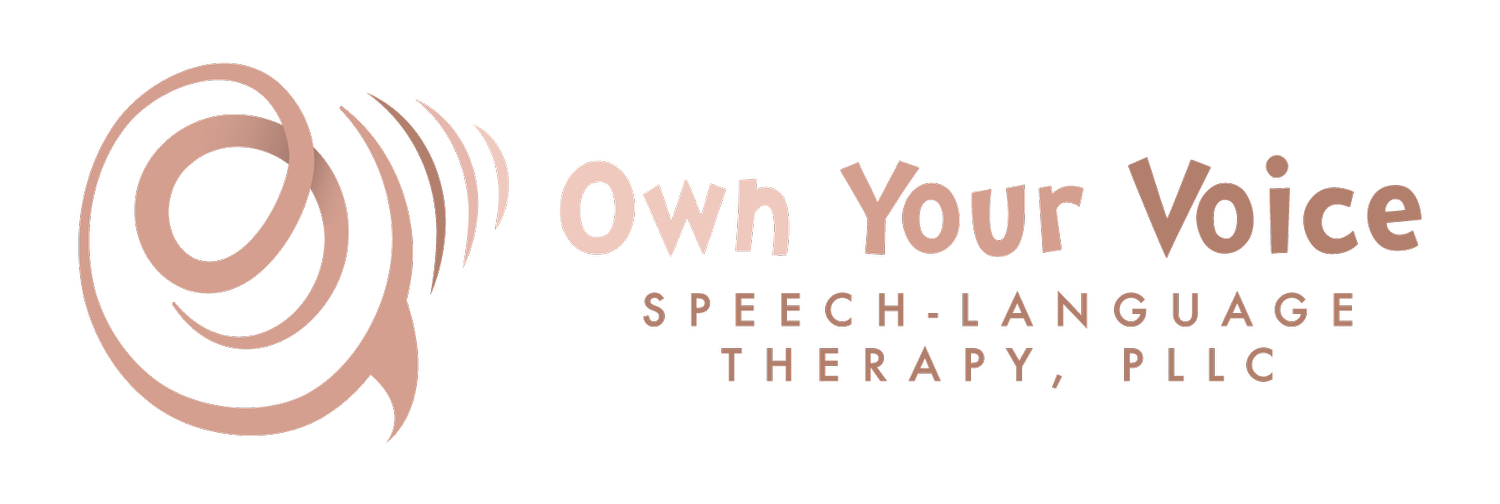Areas of Treatment
-
Early language skills begin to develop since the child is born. Pre-language skills involve response to environment, object permanence, eye contact, turn taking, joint attention, and imitation skills to name a few. Own Your Voice Speech Therapy PLLC., provides services to children as young as 1 year old. Services are always child-lead and play based to create a fun and interactive environment in which the child develops the skills needed to communicate. Parents are encouraged to participate in these sessions for better carry over and generalization during their daily routines.
-
Language is comprised by receptive language and expressive language. Receptive language refers to an individual's capacity to understand gestures, verbal or written forms of communication. This includes comprehension of their surroundings, following instructions, responding in social interactions, and answering questions. Therapy will primarily focus on improving the individual's ability to understand directions, distinguish and interpret words and phrases, and other related skills.
Expressive language refers to a child’s ability to communicate using verbal speech, gestures, written or other forms of communication such as augmentative and alternative communication. Therapy services will concentrate on developing functional communication skills, such as the ability to express one's needs. Additionally, efforts will be made to expand vocabulary, construct complex sentences, improve grammar, and enhance various communication functions like commenting, naming, showing, expressing emotions, answering, and asking questions.
Expressive and Receptive language disorders involve difficulties in their comprehension, expression or both. This can include language delays, disorders, social pragmatic language disorders and more. If you have concerns, we can help!
-
A person who stutters experiences interruptions in their natural speech patterns. Stuttering might present as repetition of part words, prolongation of sounds in words and blockage and is often accompanied by social anxiety, secondary behaviors and negative emotions.
Treatment will depend on the individual’s age and needs. For children it will focus on understanding, acceptance, learning fluency techniques, as well as on modifying their environment depending on the approach most appropriate for them. For adolescents for example, or older individuals, treatment will focus on developing positive feelings around their stutter, targeting any negative emotions or social anxiety the individual might have developed, and on using fluency sharing techniques depending on the person’s desires.
If you notice your child is developing disfluencies, has stuttered for 6 months or longer, the stutter gets progressively worse, onset of stuttering was between 3-4 years of age, and/or shows facial tension when speaking, it is important you seek a speech language pathologist for an evaluation.
-
Speech sound disorders are composed by a variety of conditions that affect the way the child produces speech. These can include disorders of articulation, phonology, acquired and childhood apraxia of speech and dysarthria of speech. Treatment will vary depending on the disorder your child presents with.
-
Social communication encompasses the utilization and interpretation of nonverbal cues, body language, and conversational rules to effectively communicate and engage with others across various social contexts. In the case of children with social communication differences, they may encounter challenges when it comes to utilizing both verbal and nonverbal language for social purposes. Consequently, these difficulties can significantly impact their ability to interact with others and comprehend social cues and language processing.
Some specific differences that may arise in children with social communication differences include:
-Difficulties greeting
-Difficulty understanding inferences
-Inability to repair communication breakdowns
-Impaired engagement in conversation (Turn taking, initiating conversation, topic maintenance etc.)
-Trouble telling and comprehending stories
Addressing and providing support tailored to these social communication differences can help children overcome these challenges and improve their overall social interactions and relationships
-
Many children struggle with their relationship with food, which can impact their overall food intake for various reasons. Some of these reasons may include sensory differences, such as how they process sensory information, as well as motor or oral-motor structural differences. It is crucial to determine whether your child's feeding behavior falls within the norm or if it constitutes picky eating or a feeding disorder, as this can affect their growth and development.
Are there specific tastes, textures, or preparations your child strongly prefers?
Does your child have a limited variety of foods they will eat?
Is there a restricted number of foods your child will accept?
Does your child's avoidance behavior significantly disrupt family meals?
These are some of the signs that indicate a child may be a picky eater or problem feeder. Own Your Voice Speech-Language Therapy, PLLC., provides skilled feeding therapy to help your child build a healthy relationship with food.
-
Children who are primarily non-speaking, minimally speaking, cannot meet all of their communication needs using spoken speech or have complex communication needs, have the right to have access to total communication. This can include low tech and high-tech alternative forms of communication such as signs, gestures, facial expressions, communication books, boards with picture symbols, communication device etc.
Let us help your child find their voice so they can learn to express their thoughts, needs, wants and ideas, through the form of communication that honor’s their best unique self.
-
Speech, Language and Feeding Therapy
Autism
Early Intervention
Receptive & Expressive Language Disorders
Language Processing Disorders
Social Communication
Augmentative and Alternative Communication (AAC)
Gestalt Language Processing
Articulation Disorder
Phonological Disorder
Childhood Apraxia of Speech
Picky Eaters & Problem Feeders

